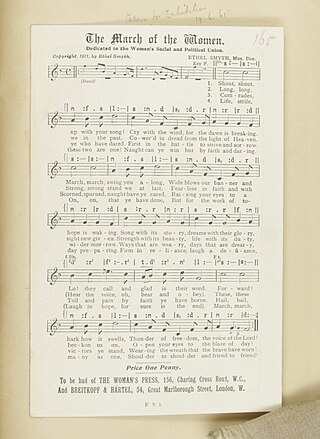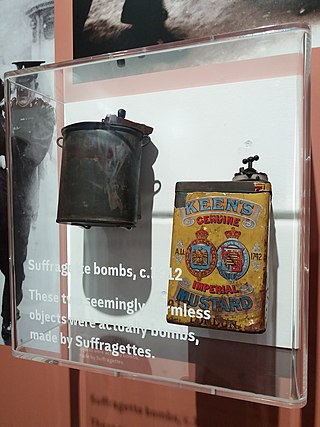
The Prisoners Act 1913, commonly referred to as the Cat and Mouse Act, was an Act of Parliament passed in Britain under H. H. Asquith's Liberal government in 1913.

The Women's Social and Political Union (WSPU) was a women-only political movement and leading militant organisation campaigning for women's suffrage in the United Kingdom from 1903 to 1918. Known from 1906 as the suffragettes, its membership and policies were tightly controlled by Emmeline Pankhurst and her daughters Christabel and Sylvia; Sylvia was eventually expelled.

Rosa May Billinghurst was a British suffragette and women's rights activist. She was known popularly as the "cripple suffragette" as she campaigned in a tricycle.

Emmeline Pethick-Lawrence, Baroness Pethick-Lawrence was a British women's rights activist and suffragette.

Marion Wallace Dunlop was a Scottish artist and author. She was the first and one of the most well known British suffragettes to go on hunger strike, on 5 July 1909, after being arrested in July 1909 for militancy. She said she would not take any food unless she was treated as a political prisoner instead of as a common criminal. Wallace Dunlop's mode of protest influenced suffragettes after her and other leaders like M. K. Gandhi and James Connolly, who also used fasting to protest British rule. She was at the centre of the Women's Social and Political Union and designed processions and banners for them.

A suffragette was a member of an activist women's organisation in the early 20th century who, under the banner "Votes for Women", fought for the right to vote in public elections in the United Kingdom. The term refers in particular to members of the British Women's Social and Political Union (WSPU), a women-only movement founded in 1903 by Emmeline Pankhurst, which engaged in direct action and civil disobedience. In 1906, a reporter writing in the Daily Mail coined the term suffragette for the WSPU, derived from suffragist, in order to belittle the women advocating women's suffrage. The militants embraced the new name, even adopting it for use as the title of the newspaper published by the WSPU.

"The March of the Women" is a song composed by Ethel Smyth in 1910, to words by Cicely Hamilton. It became the official anthem of the Women's Social and Political Union (WSPU) and more widely the anthem of the women's suffrage movement throughout the United Kingdom and elsewhere. Activists sang it not only at rallies but also in prison while they were on hunger strike. Smyth produced a number of different arrangements of the work.

Lucy Minnie Baldock was a British suffragette. Along with Annie Kenney, she co-founded the first branch in London of the Women's Social and Political Union.
Jessie Cunningham Methven was a Scottish campaigner for women's suffrage. She was honorary secretary of the Edinburgh National Society for Women's Suffrage from the mid 1890s until 1906. She subsequently joined the more militant Women's Social and Political Union and described herself as an "independent socialist".
Florence Jessie Hull was a British suffragette who wrote about her experience of being imprisoned for the cause. She was a member of the Women's Social and Political Union (WSPU) and secretary of its Letchworth branch. She was an active campaigner for women's suffrage and served time in prison for her role in a suffragette protest. Her arrest took place in the context of a window smashing campaign by the WSPU. Hull is noted on the Roll of Honour of Suffragette Prisoners 1905-1914.

Edith Hudson was a British nurse and suffragette. She was an active member of the Edinburgh branch of the Women's Social and Political Union (WSPU) and was arrested several times for her part in their protests in Scotland and London. She engaged in hunger strikes while in prison and was forcibly fed. She was released after the last of these strikes under the so-called Cat and Mouse Act. Hudson was awarded a Hunger Strike Medal 'for Valour' by the WSPU.
Elizabethand Agnes Thomson were Scottish suffragettes and members of the Edinburgh branch of the Women's Social and Political Union. They were arrested for their involvement in WSPU protests in Scotland and London. The sisters were involved in the first arson attempt in Scotland as part of the WSPU arson campaign in 1913. Elizabeth was imprisoned for her role and went on hunger strike. She was later released under the Prisoners Act 1913, so-called Cat and Mouse Act. Elizabeth was awarded a Hunger Strike Medal 'for Valour' by the WSPU.

The Hunger Strike Medal was a silver medal awarded between August 1909 and 1914 to suffragette prisoners by the leadership of the Women's Social and Political Union (WSPU). During their imprisonment, they went on hunger strike while serving their sentences in the prisons of the United Kingdom for acts of militancy in their campaign for women's suffrage. Many women were force-fed and their individual medals were created to reflect this.
Patricia Woodlock was a British artist and suffragette who was imprisoned seven times, including serving the longest suffragette prison sentence in 1908 ; she was awarded a Women's Social and Political Union (WSPU) Hunger Strike Medal for Valour. Her harsh sentence caused outrage among supporters and inspired others to join the protests. Her release was celebrated in Liverpool and London and drawn as a dreadnought warship, on the cover of the WSPU Votes for Women newsletter.

Florence Mary Canning was a British suffragette and Chair of the Executive Committee of the Church League for Women's Suffrage.

Katherine Douglas Smith was a militant British suffragette and from 1908 a paid organiser of the Women's Social and Political Union (WSPU). She was also a member of the International Suffrage Club.

Suffragettes in Great Britain and Ireland orchestrated a bombing and arson campaign between the years 1912 and 1914. The campaign was instigated by the Women's Social and Political Union (WSPU), and was a part of their wider campaign for women's suffrage. The campaign, led by key WSPU figures such as Emmeline Pankhurst, targeted infrastructure, government, churches and the general public, and saw the use of improvised explosive devices, arson, letter bombs, assassination attempts and other forms of direct action and violence.
Florence Elizabeth Mary MacAulay (1862-1945) was a British suffragist and part of the Women's Social and Political Union (WSPU). In 1909, she wrote the lyrics to The Women's Marseillaise, which was a popular marching song for the WSPU.
Bertha Brewster was a British peace activist and suffragette who achieved fame with her letter to the Editor of The Daily Telegraph in February 1913. She was arrested five times, imprisoned twice and received the Hunger Strike Medal from the Women's Social and Political Union (WSPU).













